The Impact of Legislation, Ethics, and CSR on Tourism Businesses
VerifiedAdded on 2021/01/02
|14
|4459
|270
Report
AI Summary
This report provides an in-depth analysis of legislation, ethical considerations, and corporate social responsibility (CSR) within the travel and tourism sector, using the Thomas Cook Group as a case study. It explores the implications of health, safety, and security legislation, emphasizing the employer's responsibilities in ensuring a safe working environment. The report further examines equality legislation, including the Equality Act 2010 and related acts such as the Equal Pay Act 1970, Sex Discrimination Act 1975, and Race Relation Act 1976, illustrating how these laws aim to reduce discrimination. Ethical dilemmas faced by the tourism sector, such as bribery, corruption, and discrimination, are discussed, along with the importance of ethical codes. Finally, the report investigates the CSR practices of Thomas Cook, highlighting environmental protection, philanthropy, and the benefits of CSR for the company's brand image and stakeholder relationships. The conclusion emphasizes the importance of ethical decision-making and sustainable development within the tourism industry.
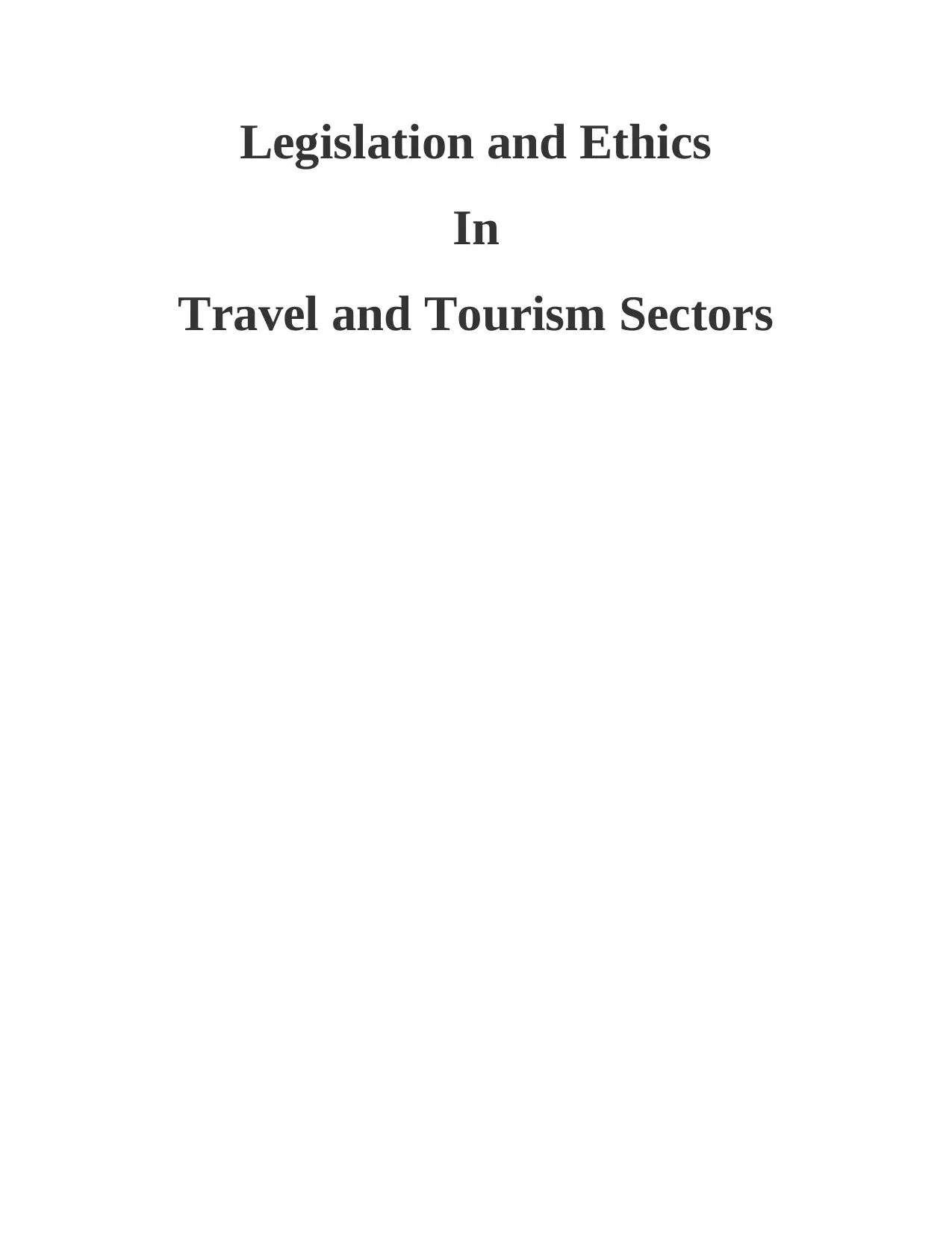
Legislation and Ethics
In
Travel and Tourism Sectors
In
Travel and Tourism Sectors
Paraphrase This Document
Need a fresh take? Get an instant paraphrase of this document with our AI Paraphraser
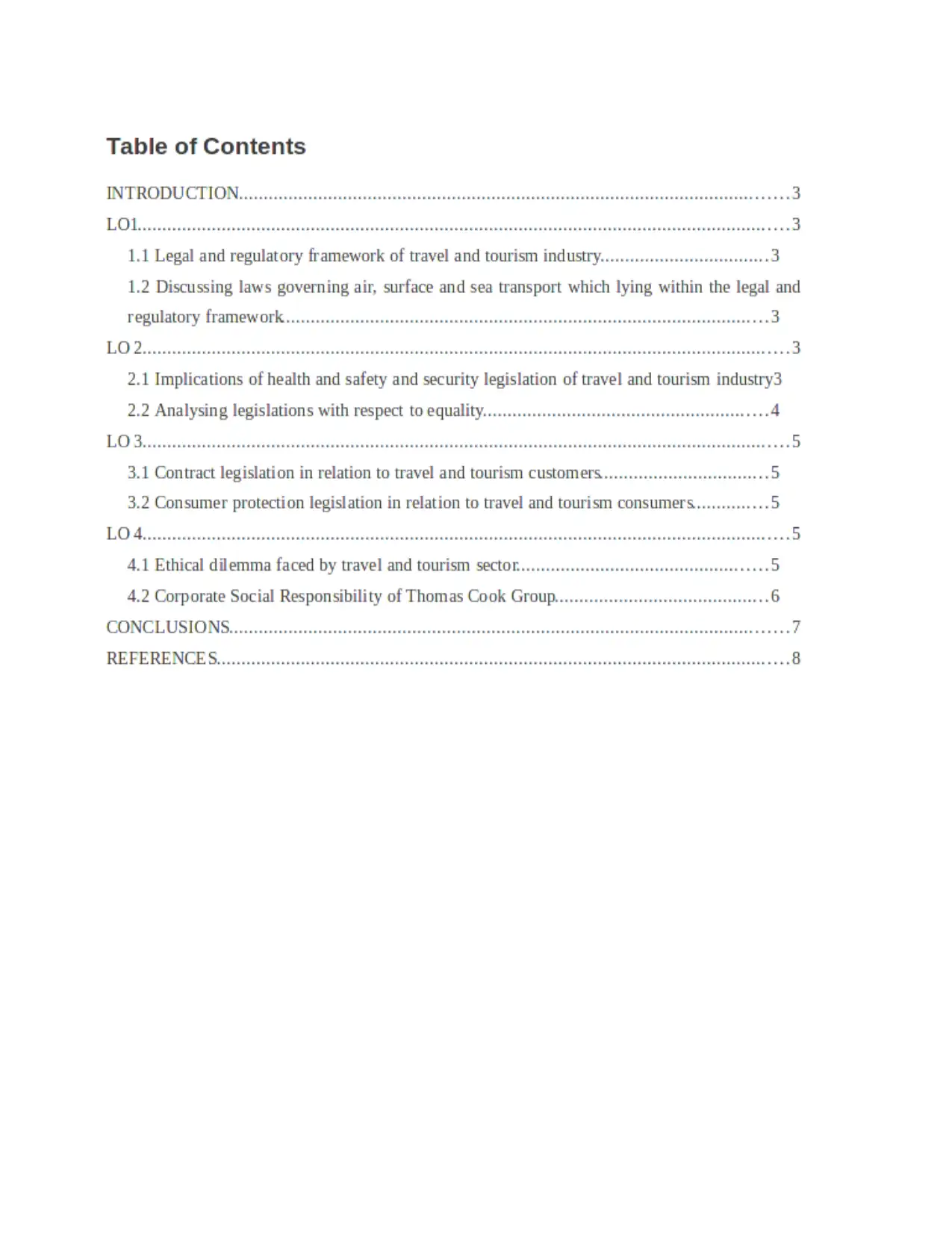
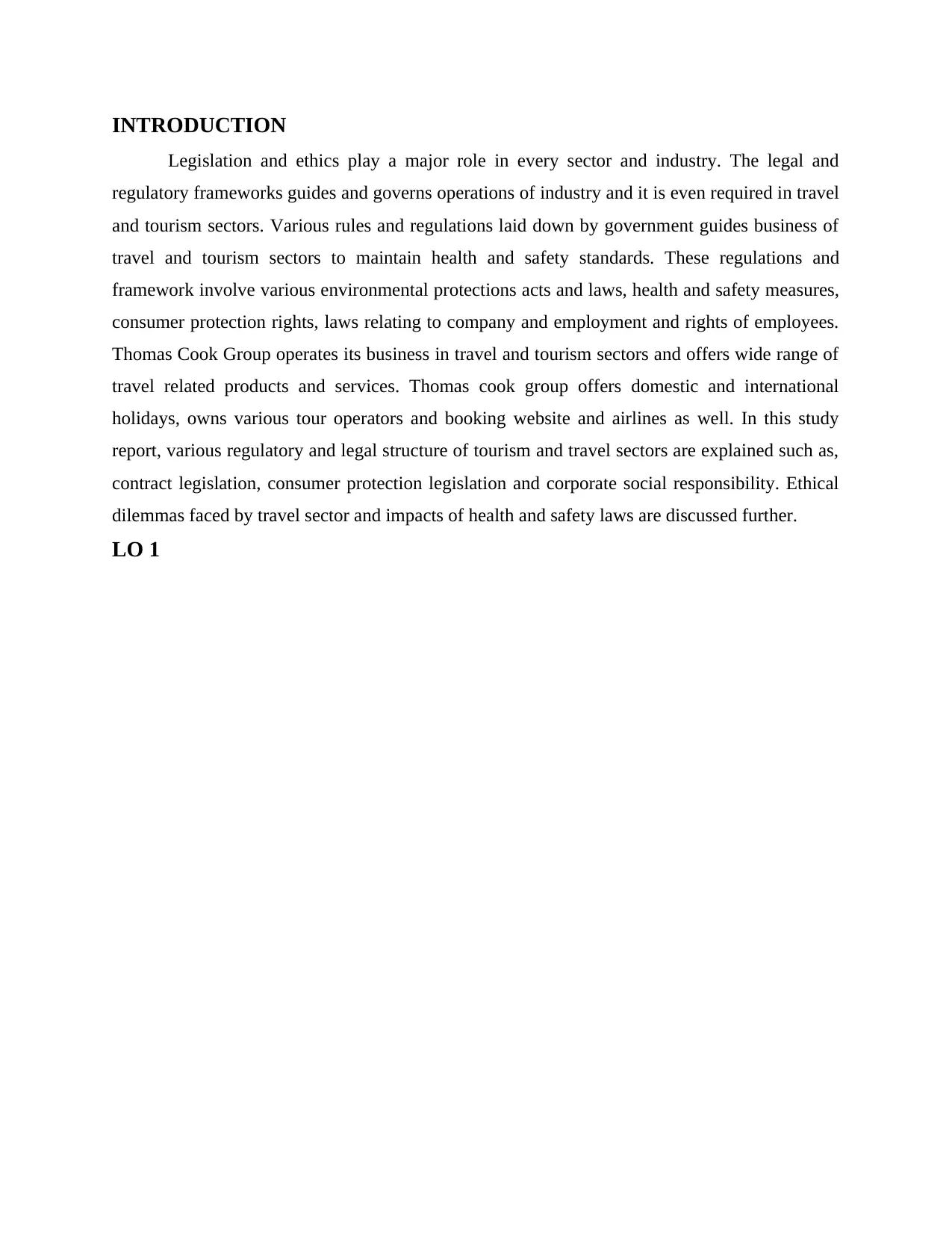
INTRODUCTION
Legislation and ethics play a major role in every sector and industry. The legal and
regulatory frameworks guides and governs operations of industry and it is even required in travel
and tourism sectors. Various rules and regulations laid down by government guides business of
travel and tourism sectors to maintain health and safety standards. These regulations and
framework involve various environmental protections acts and laws, health and safety measures,
consumer protection rights, laws relating to company and employment and rights of employees.
Thomas Cook Group operates its business in travel and tourism sectors and offers wide range of
travel related products and services. Thomas cook group offers domestic and international
holidays, owns various tour operators and booking website and airlines as well. In this study
report, various regulatory and legal structure of tourism and travel sectors are explained such as,
contract legislation, consumer protection legislation and corporate social responsibility. Ethical
dilemmas faced by travel sector and impacts of health and safety laws are discussed further.
LO 1
Legislation and ethics play a major role in every sector and industry. The legal and
regulatory frameworks guides and governs operations of industry and it is even required in travel
and tourism sectors. Various rules and regulations laid down by government guides business of
travel and tourism sectors to maintain health and safety standards. These regulations and
framework involve various environmental protections acts and laws, health and safety measures,
consumer protection rights, laws relating to company and employment and rights of employees.
Thomas Cook Group operates its business in travel and tourism sectors and offers wide range of
travel related products and services. Thomas cook group offers domestic and international
holidays, owns various tour operators and booking website and airlines as well. In this study
report, various regulatory and legal structure of tourism and travel sectors are explained such as,
contract legislation, consumer protection legislation and corporate social responsibility. Ethical
dilemmas faced by travel sector and impacts of health and safety laws are discussed further.
LO 1
⊘ This is a preview!⊘
Do you want full access?
Subscribe today to unlock all pages.

Trusted by 1+ million students worldwide
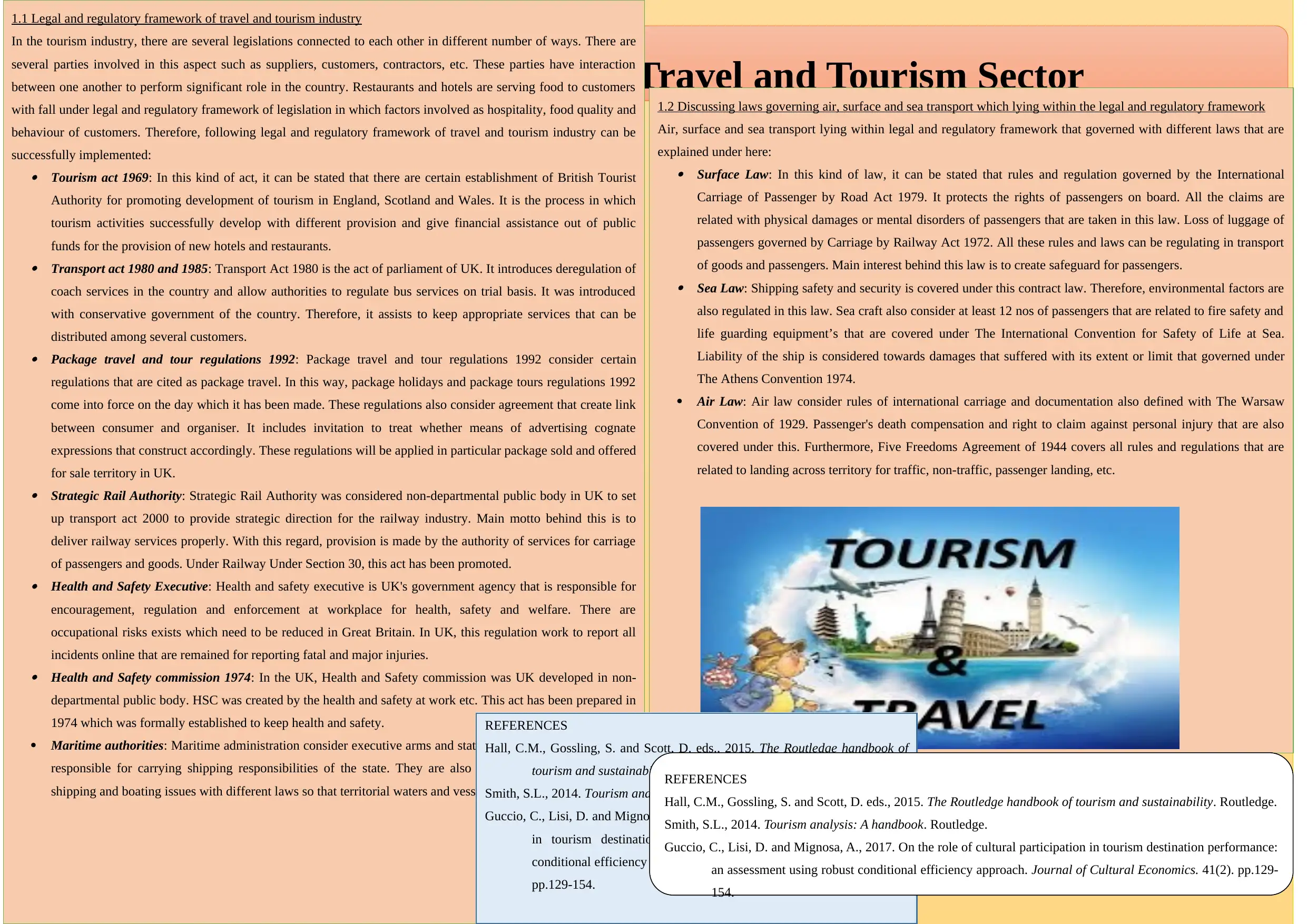
Legislation and Ethics in Travel and Tourism Sector
1.1 Legal and regulatory framework of travel and tourism industry
In the tourism industry, there are several legislations connected to each other in different number of ways. There are
several parties involved in this aspect such as suppliers, customers, contractors, etc. These parties have interaction
between one another to perform significant role in the country. Restaurants and hotels are serving food to customers
with fall under legal and regulatory framework of legislation in which factors involved as hospitality, food quality and
behaviour of customers. Therefore, following legal and regulatory framework of travel and tourism industry can be
successfully implemented:
Tourism act 1969: In this kind of act, it can be stated that there are certain establishment of British Tourist
Authority for promoting development of tourism in England, Scotland and Wales. It is the process in which
tourism activities successfully develop with different provision and give financial assistance out of public
funds for the provision of new hotels and restaurants.
Transport act 1980 and 1985: Transport Act 1980 is the act of parliament of UK. It introduces deregulation of
coach services in the country and allow authorities to regulate bus services on trial basis. It was introduced
with conservative government of the country. Therefore, it assists to keep appropriate services that can be
distributed among several customers.
Package travel and tour regulations 1992: Package travel and tour regulations 1992 consider certain
regulations that are cited as package travel. In this way, package holidays and package tours regulations 1992
come into force on the day which it has been made. These regulations also consider agreement that create link
between consumer and organiser. It includes invitation to treat whether means of advertising cognate
expressions that construct accordingly. These regulations will be applied in particular package sold and offered
for sale territory in UK.
Strategic Rail Authority: Strategic Rail Authority was considered non-departmental public body in UK to set
up transport act 2000 to provide strategic direction for the railway industry. Main motto behind this is to
deliver railway services properly. With this regard, provision is made by the authority of services for carriage
of passengers and goods. Under Railway Under Section 30, this act has been promoted.
Health and Safety Executive: Health and safety executive is UK's government agency that is responsible for
encouragement, regulation and enforcement at workplace for health, safety and welfare. There are
occupational risks exists which need to be reduced in Great Britain. In UK, this regulation work to report all
incidents online that are remained for reporting fatal and major injuries.
Health and Safety commission 1974: In the UK, Health and Safety commission was UK developed in non-
departmental public body. HSC was created by the health and safety at work etc. This act has been prepared in
1974 which was formally established to keep health and safety.
Maritime authorities: Maritime administration consider executive arms and state bodies in which government
responsible for carrying shipping responsibilities of the state. They are also tasked to administer national
shipping and boating issues with different laws so that territorial waters and vessels flagged in it.
1.2 Discussing laws governing air, surface and sea transport which lying within the legal and regulatory framework
Air, surface and sea transport lying within legal and regulatory framework that governed with different laws that are
explained under here:
Surface Law: In this kind of law, it can be stated that rules and regulation governed by the International
Carriage of Passenger by Road Act 1979. It protects the rights of passengers on board. All the claims are
related with physical damages or mental disorders of passengers that are taken in this law. Loss of luggage of
passengers governed by Carriage by Railway Act 1972. All these rules and laws can be regulating in transport
of goods and passengers. Main interest behind this law is to create safeguard for passengers.
Sea Law: Shipping safety and security is covered under this contract law. Therefore, environmental factors are
also regulated in this law. Sea craft also consider at least 12 nos of passengers that are related to fire safety and
life guarding equipment’s that are covered under The International Convention for Safety of Life at Sea.
Liability of the ship is considered towards damages that suffered with its extent or limit that governed under
The Athens Convention 1974.
Air Law: Air law consider rules of international carriage and documentation also defined with The Warsaw
Convention of 1929. Passenger's death compensation and right to claim against personal injury that are also
covered under this. Furthermore, Five Freedoms Agreement of 1944 covers all rules and regulations that are
related to landing across territory for traffic, non-traffic, passenger landing, etc.
REFERENCES
Hall, C.M., Gossling, S. and Scott, D. eds., 2015. The Routledge handbook of
tourism and sustainability. Routledge.
Smith, S.L., 2014. Tourism analysis: A handbook. Routledge.
Guccio, C., Lisi, D. and Mignosa, A., 2017. On the role of cultural participation
in tourism destination performance: an assessment using robust
conditional efficiency approach. Journal of Cultural Economics. 41(2).
pp.129-154.
REFERENCES
Hall, C.M., Gossling, S. and Scott, D. eds., 2015. The Routledge handbook of tourism and sustainability. Routledge.
Smith, S.L., 2014. Tourism analysis: A handbook. Routledge.
Guccio, C., Lisi, D. and Mignosa, A., 2017. On the role of cultural participation in tourism destination performance:
an assessment using robust conditional efficiency approach. Journal of Cultural Economics. 41(2). pp.129-
154.
1.1 Legal and regulatory framework of travel and tourism industry
In the tourism industry, there are several legislations connected to each other in different number of ways. There are
several parties involved in this aspect such as suppliers, customers, contractors, etc. These parties have interaction
between one another to perform significant role in the country. Restaurants and hotels are serving food to customers
with fall under legal and regulatory framework of legislation in which factors involved as hospitality, food quality and
behaviour of customers. Therefore, following legal and regulatory framework of travel and tourism industry can be
successfully implemented:
Tourism act 1969: In this kind of act, it can be stated that there are certain establishment of British Tourist
Authority for promoting development of tourism in England, Scotland and Wales. It is the process in which
tourism activities successfully develop with different provision and give financial assistance out of public
funds for the provision of new hotels and restaurants.
Transport act 1980 and 1985: Transport Act 1980 is the act of parliament of UK. It introduces deregulation of
coach services in the country and allow authorities to regulate bus services on trial basis. It was introduced
with conservative government of the country. Therefore, it assists to keep appropriate services that can be
distributed among several customers.
Package travel and tour regulations 1992: Package travel and tour regulations 1992 consider certain
regulations that are cited as package travel. In this way, package holidays and package tours regulations 1992
come into force on the day which it has been made. These regulations also consider agreement that create link
between consumer and organiser. It includes invitation to treat whether means of advertising cognate
expressions that construct accordingly. These regulations will be applied in particular package sold and offered
for sale territory in UK.
Strategic Rail Authority: Strategic Rail Authority was considered non-departmental public body in UK to set
up transport act 2000 to provide strategic direction for the railway industry. Main motto behind this is to
deliver railway services properly. With this regard, provision is made by the authority of services for carriage
of passengers and goods. Under Railway Under Section 30, this act has been promoted.
Health and Safety Executive: Health and safety executive is UK's government agency that is responsible for
encouragement, regulation and enforcement at workplace for health, safety and welfare. There are
occupational risks exists which need to be reduced in Great Britain. In UK, this regulation work to report all
incidents online that are remained for reporting fatal and major injuries.
Health and Safety commission 1974: In the UK, Health and Safety commission was UK developed in non-
departmental public body. HSC was created by the health and safety at work etc. This act has been prepared in
1974 which was formally established to keep health and safety.
Maritime authorities: Maritime administration consider executive arms and state bodies in which government
responsible for carrying shipping responsibilities of the state. They are also tasked to administer national
shipping and boating issues with different laws so that territorial waters and vessels flagged in it.
1.2 Discussing laws governing air, surface and sea transport which lying within the legal and regulatory framework
Air, surface and sea transport lying within legal and regulatory framework that governed with different laws that are
explained under here:
Surface Law: In this kind of law, it can be stated that rules and regulation governed by the International
Carriage of Passenger by Road Act 1979. It protects the rights of passengers on board. All the claims are
related with physical damages or mental disorders of passengers that are taken in this law. Loss of luggage of
passengers governed by Carriage by Railway Act 1972. All these rules and laws can be regulating in transport
of goods and passengers. Main interest behind this law is to create safeguard for passengers.
Sea Law: Shipping safety and security is covered under this contract law. Therefore, environmental factors are
also regulated in this law. Sea craft also consider at least 12 nos of passengers that are related to fire safety and
life guarding equipment’s that are covered under The International Convention for Safety of Life at Sea.
Liability of the ship is considered towards damages that suffered with its extent or limit that governed under
The Athens Convention 1974.
Air Law: Air law consider rules of international carriage and documentation also defined with The Warsaw
Convention of 1929. Passenger's death compensation and right to claim against personal injury that are also
covered under this. Furthermore, Five Freedoms Agreement of 1944 covers all rules and regulations that are
related to landing across territory for traffic, non-traffic, passenger landing, etc.
REFERENCES
Hall, C.M., Gossling, S. and Scott, D. eds., 2015. The Routledge handbook of
tourism and sustainability. Routledge.
Smith, S.L., 2014. Tourism analysis: A handbook. Routledge.
Guccio, C., Lisi, D. and Mignosa, A., 2017. On the role of cultural participation
in tourism destination performance: an assessment using robust
conditional efficiency approach. Journal of Cultural Economics. 41(2).
pp.129-154.
REFERENCES
Hall, C.M., Gossling, S. and Scott, D. eds., 2015. The Routledge handbook of tourism and sustainability. Routledge.
Smith, S.L., 2014. Tourism analysis: A handbook. Routledge.
Guccio, C., Lisi, D. and Mignosa, A., 2017. On the role of cultural participation in tourism destination performance:
an assessment using robust conditional efficiency approach. Journal of Cultural Economics. 41(2). pp.129-
154.
Paraphrase This Document
Need a fresh take? Get an instant paraphrase of this document with our AI Paraphraser

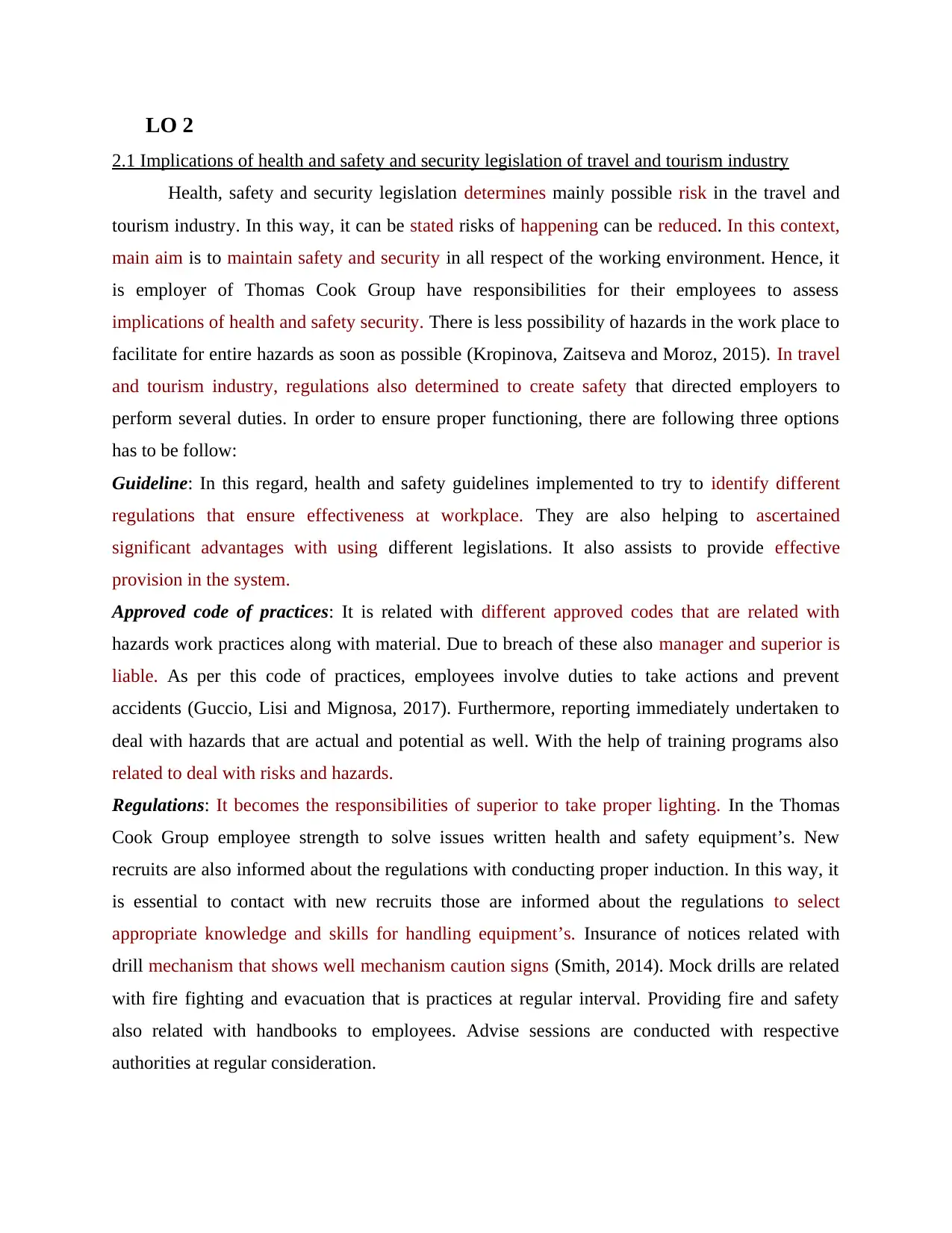
LO 2
2.1 Implications of health and safety and security legislation of travel and tourism industry
Health, safety and security legislation determines mainly possible risk in the travel and
tourism industry. In this way, it can be stated risks of happening can be reduced. In this context,
main aim is to maintain safety and security in all respect of the working environment. Hence, it
is employer of Thomas Cook Group have responsibilities for their employees to assess
implications of health and safety security. There is less possibility of hazards in the work place to
facilitate for entire hazards as soon as possible (Kropinova, Zaitseva and Moroz, 2015). In travel
and tourism industry, regulations also determined to create safety that directed employers to
perform several duties. In order to ensure proper functioning, there are following three options
has to be follow:
Guideline: In this regard, health and safety guidelines implemented to try to identify different
regulations that ensure effectiveness at workplace. They are also helping to ascertained
significant advantages with using different legislations. It also assists to provide effective
provision in the system.
Approved code of practices: It is related with different approved codes that are related with
hazards work practices along with material. Due to breach of these also manager and superior is
liable. As per this code of practices, employees involve duties to take actions and prevent
accidents (Guccio, Lisi and Mignosa, 2017). Furthermore, reporting immediately undertaken to
deal with hazards that are actual and potential as well. With the help of training programs also
related to deal with risks and hazards.
Regulations: It becomes the responsibilities of superior to take proper lighting. In the Thomas
Cook Group employee strength to solve issues written health and safety equipment’s. New
recruits are also informed about the regulations with conducting proper induction. In this way, it
is essential to contact with new recruits those are informed about the regulations to select
appropriate knowledge and skills for handling equipment’s. Insurance of notices related with
drill mechanism that shows well mechanism caution signs (Smith, 2014). Mock drills are related
with fire fighting and evacuation that is practices at regular interval. Providing fire and safety
also related with handbooks to employees. Advise sessions are conducted with respective
authorities at regular consideration.
2.1 Implications of health and safety and security legislation of travel and tourism industry
Health, safety and security legislation determines mainly possible risk in the travel and
tourism industry. In this way, it can be stated risks of happening can be reduced. In this context,
main aim is to maintain safety and security in all respect of the working environment. Hence, it
is employer of Thomas Cook Group have responsibilities for their employees to assess
implications of health and safety security. There is less possibility of hazards in the work place to
facilitate for entire hazards as soon as possible (Kropinova, Zaitseva and Moroz, 2015). In travel
and tourism industry, regulations also determined to create safety that directed employers to
perform several duties. In order to ensure proper functioning, there are following three options
has to be follow:
Guideline: In this regard, health and safety guidelines implemented to try to identify different
regulations that ensure effectiveness at workplace. They are also helping to ascertained
significant advantages with using different legislations. It also assists to provide effective
provision in the system.
Approved code of practices: It is related with different approved codes that are related with
hazards work practices along with material. Due to breach of these also manager and superior is
liable. As per this code of practices, employees involve duties to take actions and prevent
accidents (Guccio, Lisi and Mignosa, 2017). Furthermore, reporting immediately undertaken to
deal with hazards that are actual and potential as well. With the help of training programs also
related to deal with risks and hazards.
Regulations: It becomes the responsibilities of superior to take proper lighting. In the Thomas
Cook Group employee strength to solve issues written health and safety equipment’s. New
recruits are also informed about the regulations with conducting proper induction. In this way, it
is essential to contact with new recruits those are informed about the regulations to select
appropriate knowledge and skills for handling equipment’s. Insurance of notices related with
drill mechanism that shows well mechanism caution signs (Smith, 2014). Mock drills are related
with fire fighting and evacuation that is practices at regular interval. Providing fire and safety
also related with handbooks to employees. Advise sessions are conducted with respective
authorities at regular consideration.
⊘ This is a preview!⊘
Do you want full access?
Subscribe today to unlock all pages.

Trusted by 1+ million students worldwide
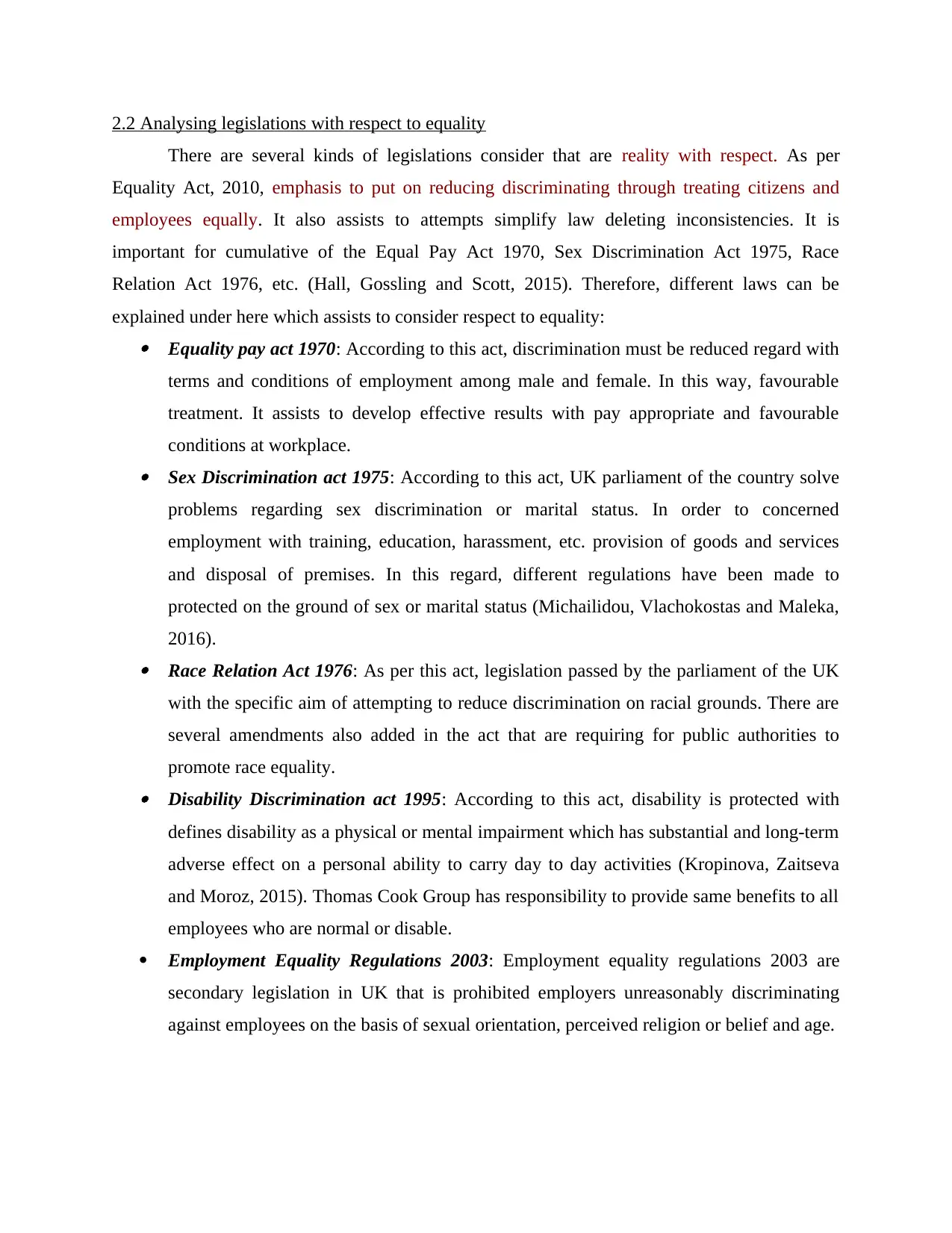
2.2 Analysing legislations with respect to equality
There are several kinds of legislations consider that are reality with respect. As per
Equality Act, 2010, emphasis to put on reducing discriminating through treating citizens and
employees equally. It also assists to attempts simplify law deleting inconsistencies. It is
important for cumulative of the Equal Pay Act 1970, Sex Discrimination Act 1975, Race
Relation Act 1976, etc. (Hall, Gossling and Scott, 2015). Therefore, different laws can be
explained under here which assists to consider respect to equality: Equality pay act 1970: According to this act, discrimination must be reduced regard with
terms and conditions of employment among male and female. In this way, favourable
treatment. It assists to develop effective results with pay appropriate and favourable
conditions at workplace. Sex Discrimination act 1975: According to this act, UK parliament of the country solve
problems regarding sex discrimination or marital status. In order to concerned
employment with training, education, harassment, etc. provision of goods and services
and disposal of premises. In this regard, different regulations have been made to
protected on the ground of sex or marital status (Michailidou, Vlachokostas and Maleka,
2016). Race Relation Act 1976: As per this act, legislation passed by the parliament of the UK
with the specific aim of attempting to reduce discrimination on racial grounds. There are
several amendments also added in the act that are requiring for public authorities to
promote race equality. Disability Discrimination act 1995: According to this act, disability is protected with
defines disability as a physical or mental impairment which has substantial and long-term
adverse effect on a personal ability to carry day to day activities (Kropinova, Zaitseva
and Moroz, 2015). Thomas Cook Group has responsibility to provide same benefits to all
employees who are normal or disable.
Employment Equality Regulations 2003: Employment equality regulations 2003 are
secondary legislation in UK that is prohibited employers unreasonably discriminating
against employees on the basis of sexual orientation, perceived religion or belief and age.
There are several kinds of legislations consider that are reality with respect. As per
Equality Act, 2010, emphasis to put on reducing discriminating through treating citizens and
employees equally. It also assists to attempts simplify law deleting inconsistencies. It is
important for cumulative of the Equal Pay Act 1970, Sex Discrimination Act 1975, Race
Relation Act 1976, etc. (Hall, Gossling and Scott, 2015). Therefore, different laws can be
explained under here which assists to consider respect to equality: Equality pay act 1970: According to this act, discrimination must be reduced regard with
terms and conditions of employment among male and female. In this way, favourable
treatment. It assists to develop effective results with pay appropriate and favourable
conditions at workplace. Sex Discrimination act 1975: According to this act, UK parliament of the country solve
problems regarding sex discrimination or marital status. In order to concerned
employment with training, education, harassment, etc. provision of goods and services
and disposal of premises. In this regard, different regulations have been made to
protected on the ground of sex or marital status (Michailidou, Vlachokostas and Maleka,
2016). Race Relation Act 1976: As per this act, legislation passed by the parliament of the UK
with the specific aim of attempting to reduce discrimination on racial grounds. There are
several amendments also added in the act that are requiring for public authorities to
promote race equality. Disability Discrimination act 1995: According to this act, disability is protected with
defines disability as a physical or mental impairment which has substantial and long-term
adverse effect on a personal ability to carry day to day activities (Kropinova, Zaitseva
and Moroz, 2015). Thomas Cook Group has responsibility to provide same benefits to all
employees who are normal or disable.
Employment Equality Regulations 2003: Employment equality regulations 2003 are
secondary legislation in UK that is prohibited employers unreasonably discriminating
against employees on the basis of sexual orientation, perceived religion or belief and age.
Paraphrase This Document
Need a fresh take? Get an instant paraphrase of this document with our AI Paraphraser

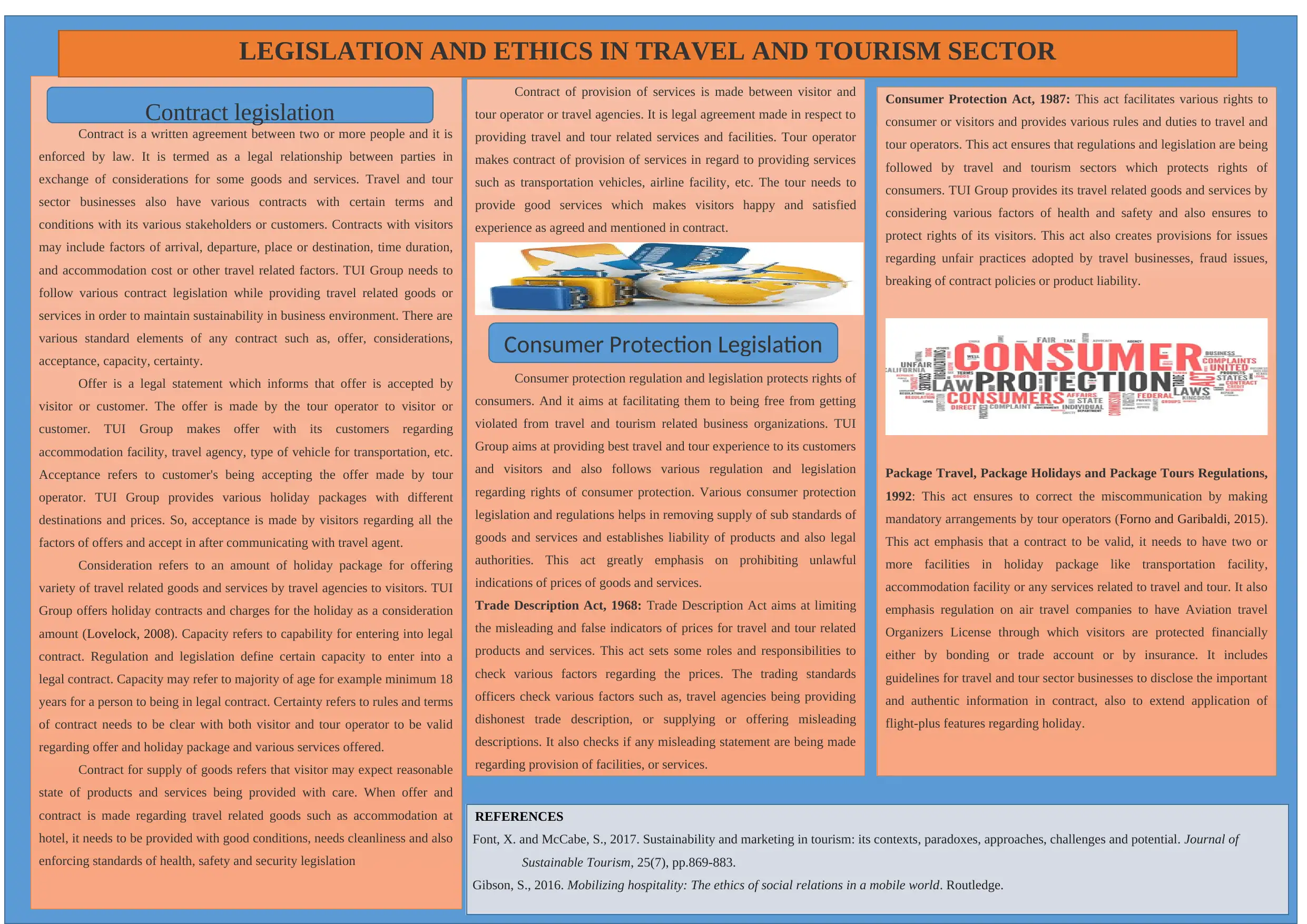
LO 3
Contract is a written agreement between two or more people and it is
enforced by law. It is termed as a legal relationship between parties in
exchange of considerations for some goods and services. Travel and tour
sector businesses also have various contracts with certain terms and
conditions with its various stakeholders or customers. Contracts with visitors
may include factors of arrival, departure, place or destination, time duration,
and accommodation cost or other travel related factors. TUI Group needs to
follow various contract legislation while providing travel related goods or
services in order to maintain sustainability in business environment. There are
various standard elements of any contract such as, offer, considerations,
acceptance, capacity, certainty.
Offer is a legal statement which informs that offer is accepted by
visitor or customer. The offer is made by the tour operator to visitor or
customer. TUI Group makes offer with its customers regarding
accommodation facility, travel agency, type of vehicle for transportation, etc.
Acceptance refers to customer's being accepting the offer made by tour
operator. TUI Group provides various holiday packages with different
destinations and prices. So, acceptance is made by visitors regarding all the
factors of offers and accept in after communicating with travel agent.
Consideration refers to an amount of holiday package for offering
variety of travel related goods and services by travel agencies to visitors. TUI
Group offers holiday contracts and charges for the holiday as a consideration
amount (Lovelock, 2008). Capacity refers to capability for entering into legal
contract. Regulation and legislation define certain capacity to enter into a
legal contract. Capacity may refer to majority of age for example minimum 18
years for a person to being in legal contract. Certainty refers to rules and terms
of contract needs to be clear with both visitor and tour operator to be valid
regarding offer and holiday package and various services offered.
Contract for supply of goods refers that visitor may expect reasonable
state of products and services being provided with care. When offer and
contract is made regarding travel related goods such as accommodation at
hotel, it needs to be provided with good conditions, needs cleanliness and also
enforcing standards of health, safety and security legislation
LEGISLATION AND ETHICS IN TRAVEL AND TOURISM SECTOR
Contract of provision of services is made between visitor and
tour operator or travel agencies. It is legal agreement made in respect to
providing travel and tour related services and facilities. Tour operator
makes contract of provision of services in regard to providing services
such as transportation vehicles, airline facility, etc. The tour needs to
provide good services which makes visitors happy and satisfied
experience as agreed and mentioned in contract.
Consumer Protection Legislation
Consumer protection regulation and legislation protects rights of
consumers. And it aims at facilitating them to being free from getting
violated from travel and tourism related business organizations. TUI
Group aims at providing best travel and tour experience to its customers
and visitors and also follows various regulation and legislation
regarding rights of consumer protection. Various consumer protection
legislation and regulations helps in removing supply of sub standards of
goods and services and establishes liability of products and also legal
authorities. This act greatly emphasis on prohibiting unlawful
indications of prices of goods and services.
Trade Description Act, 1968: Trade Description Act aims at limiting
the misleading and false indicators of prices for travel and tour related
products and services. This act sets some roles and responsibilities to
check various factors regarding the prices. The trading standards
officers check various factors such as, travel agencies being providing
dishonest trade description, or supplying or offering misleading
descriptions. It also checks if any misleading statement are being made
regarding provision of facilities, or services.
Consumer Protection Act, 1987: This act facilitates various rights to
consumer or visitors and provides various rules and duties to travel and
tour operators. This act ensures that regulations and legislation are being
followed by travel and tourism sectors which protects rights of
consumers. TUI Group provides its travel related goods and services by
considering various factors of health and safety and also ensures to
protect rights of its visitors. This act also creates provisions for issues
regarding unfair practices adopted by travel businesses, fraud issues,
breaking of contract policies or product liability.
Package Travel, Package Holidays and Package Tours Regulations,
1992: This act ensures to correct the miscommunication by making
mandatory arrangements by tour operators (Forno and Garibaldi, 2015).
This act emphasis that a contract to be valid, it needs to have two or
more facilities in holiday package like transportation facility,
accommodation facility or any services related to travel and tour. It also
emphasis regulation on air travel companies to have Aviation travel
Organizers License through which visitors are protected financially
either by bonding or trade account or by insurance. It includes
guidelines for travel and tour sector businesses to disclose the important
and authentic information in contract, also to extend application of
flight-plus features regarding holiday.
Contract legislation
REFERENCES
Font, X. and McCabe, S., 2017. Sustainability and marketing in tourism: its contexts, paradoxes, approaches, challenges and potential. Journal of
Sustainable Tourism, 25(7), pp.869-883.
Gibson, S., 2016. Mobilizing hospitality: The ethics of social relations in a mobile world. Routledge.
Contract is a written agreement between two or more people and it is
enforced by law. It is termed as a legal relationship between parties in
exchange of considerations for some goods and services. Travel and tour
sector businesses also have various contracts with certain terms and
conditions with its various stakeholders or customers. Contracts with visitors
may include factors of arrival, departure, place or destination, time duration,
and accommodation cost or other travel related factors. TUI Group needs to
follow various contract legislation while providing travel related goods or
services in order to maintain sustainability in business environment. There are
various standard elements of any contract such as, offer, considerations,
acceptance, capacity, certainty.
Offer is a legal statement which informs that offer is accepted by
visitor or customer. The offer is made by the tour operator to visitor or
customer. TUI Group makes offer with its customers regarding
accommodation facility, travel agency, type of vehicle for transportation, etc.
Acceptance refers to customer's being accepting the offer made by tour
operator. TUI Group provides various holiday packages with different
destinations and prices. So, acceptance is made by visitors regarding all the
factors of offers and accept in after communicating with travel agent.
Consideration refers to an amount of holiday package for offering
variety of travel related goods and services by travel agencies to visitors. TUI
Group offers holiday contracts and charges for the holiday as a consideration
amount (Lovelock, 2008). Capacity refers to capability for entering into legal
contract. Regulation and legislation define certain capacity to enter into a
legal contract. Capacity may refer to majority of age for example minimum 18
years for a person to being in legal contract. Certainty refers to rules and terms
of contract needs to be clear with both visitor and tour operator to be valid
regarding offer and holiday package and various services offered.
Contract for supply of goods refers that visitor may expect reasonable
state of products and services being provided with care. When offer and
contract is made regarding travel related goods such as accommodation at
hotel, it needs to be provided with good conditions, needs cleanliness and also
enforcing standards of health, safety and security legislation
LEGISLATION AND ETHICS IN TRAVEL AND TOURISM SECTOR
Contract of provision of services is made between visitor and
tour operator or travel agencies. It is legal agreement made in respect to
providing travel and tour related services and facilities. Tour operator
makes contract of provision of services in regard to providing services
such as transportation vehicles, airline facility, etc. The tour needs to
provide good services which makes visitors happy and satisfied
experience as agreed and mentioned in contract.
Consumer Protection Legislation
Consumer protection regulation and legislation protects rights of
consumers. And it aims at facilitating them to being free from getting
violated from travel and tourism related business organizations. TUI
Group aims at providing best travel and tour experience to its customers
and visitors and also follows various regulation and legislation
regarding rights of consumer protection. Various consumer protection
legislation and regulations helps in removing supply of sub standards of
goods and services and establishes liability of products and also legal
authorities. This act greatly emphasis on prohibiting unlawful
indications of prices of goods and services.
Trade Description Act, 1968: Trade Description Act aims at limiting
the misleading and false indicators of prices for travel and tour related
products and services. This act sets some roles and responsibilities to
check various factors regarding the prices. The trading standards
officers check various factors such as, travel agencies being providing
dishonest trade description, or supplying or offering misleading
descriptions. It also checks if any misleading statement are being made
regarding provision of facilities, or services.
Consumer Protection Act, 1987: This act facilitates various rights to
consumer or visitors and provides various rules and duties to travel and
tour operators. This act ensures that regulations and legislation are being
followed by travel and tourism sectors which protects rights of
consumers. TUI Group provides its travel related goods and services by
considering various factors of health and safety and also ensures to
protect rights of its visitors. This act also creates provisions for issues
regarding unfair practices adopted by travel businesses, fraud issues,
breaking of contract policies or product liability.
Package Travel, Package Holidays and Package Tours Regulations,
1992: This act ensures to correct the miscommunication by making
mandatory arrangements by tour operators (Forno and Garibaldi, 2015).
This act emphasis that a contract to be valid, it needs to have two or
more facilities in holiday package like transportation facility,
accommodation facility or any services related to travel and tour. It also
emphasis regulation on air travel companies to have Aviation travel
Organizers License through which visitors are protected financially
either by bonding or trade account or by insurance. It includes
guidelines for travel and tour sector businesses to disclose the important
and authentic information in contract, also to extend application of
flight-plus features regarding holiday.
Contract legislation
REFERENCES
Font, X. and McCabe, S., 2017. Sustainability and marketing in tourism: its contexts, paradoxes, approaches, challenges and potential. Journal of
Sustainable Tourism, 25(7), pp.869-883.
Gibson, S., 2016. Mobilizing hospitality: The ethics of social relations in a mobile world. Routledge.
⊘ This is a preview!⊘
Do you want full access?
Subscribe today to unlock all pages.

Trusted by 1+ million students worldwide
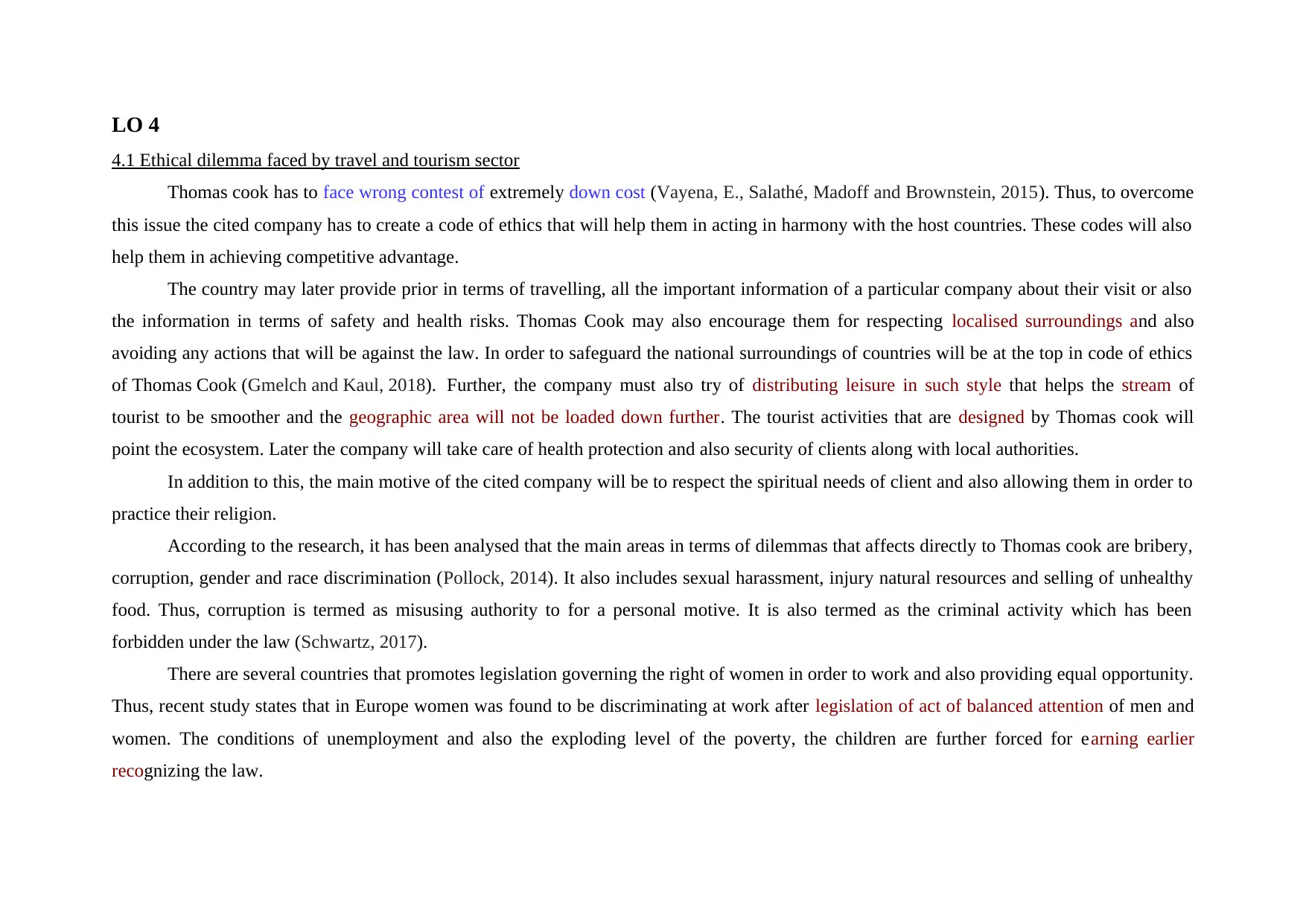
LO 4
4.1 Ethical dilemma faced by travel and tourism sector
Thomas cook has to face wrong contest of extremely down cost (Vayena, E., Salathé, Madoff and Brownstein, 2015). Thus, to overcome
this issue the cited company has to create a code of ethics that will help them in acting in harmony with the host countries. These codes will also
help them in achieving competitive advantage.
The country may later provide prior in terms of travelling, all the important information of a particular company about their visit or also
the information in terms of safety and health risks. Thomas Cook may also encourage them for respecting localised surroundings and also
avoiding any actions that will be against the law. In order to safeguard the national surroundings of countries will be at the top in code of ethics
of Thomas Cook (Gmelch and Kaul, 2018). Further, the company must also try of distributing leisure in such style that helps the stream of
tourist to be smoother and the geographic area will not be loaded down further. The tourist activities that are designed by Thomas cook will
point the ecosystem. Later the company will take care of health protection and also security of clients along with local authorities.
In addition to this, the main motive of the cited company will be to respect the spiritual needs of client and also allowing them in order to
practice their religion.
According to the research, it has been analysed that the main areas in terms of dilemmas that affects directly to Thomas cook are bribery,
corruption, gender and race discrimination (Pollock, 2014). It also includes sexual harassment, injury natural resources and selling of unhealthy
food. Thus, corruption is termed as misusing authority to for a personal motive. It is also termed as the criminal activity which has been
forbidden under the law (Schwartz, 2017).
There are several countries that promotes legislation governing the right of women in order to work and also providing equal opportunity.
Thus, recent study states that in Europe women was found to be discriminating at work after legislation of act of balanced attention of men and
women. The conditions of unemployment and also the exploding level of the poverty, the children are further forced for earning earlier
recognizing the law.
4.1 Ethical dilemma faced by travel and tourism sector
Thomas cook has to face wrong contest of extremely down cost (Vayena, E., Salathé, Madoff and Brownstein, 2015). Thus, to overcome
this issue the cited company has to create a code of ethics that will help them in acting in harmony with the host countries. These codes will also
help them in achieving competitive advantage.
The country may later provide prior in terms of travelling, all the important information of a particular company about their visit or also
the information in terms of safety and health risks. Thomas Cook may also encourage them for respecting localised surroundings and also
avoiding any actions that will be against the law. In order to safeguard the national surroundings of countries will be at the top in code of ethics
of Thomas Cook (Gmelch and Kaul, 2018). Further, the company must also try of distributing leisure in such style that helps the stream of
tourist to be smoother and the geographic area will not be loaded down further. The tourist activities that are designed by Thomas cook will
point the ecosystem. Later the company will take care of health protection and also security of clients along with local authorities.
In addition to this, the main motive of the cited company will be to respect the spiritual needs of client and also allowing them in order to
practice their religion.
According to the research, it has been analysed that the main areas in terms of dilemmas that affects directly to Thomas cook are bribery,
corruption, gender and race discrimination (Pollock, 2014). It also includes sexual harassment, injury natural resources and selling of unhealthy
food. Thus, corruption is termed as misusing authority to for a personal motive. It is also termed as the criminal activity which has been
forbidden under the law (Schwartz, 2017).
There are several countries that promotes legislation governing the right of women in order to work and also providing equal opportunity.
Thus, recent study states that in Europe women was found to be discriminating at work after legislation of act of balanced attention of men and
women. The conditions of unemployment and also the exploding level of the poverty, the children are further forced for earning earlier
recognizing the law.
Paraphrase This Document
Need a fresh take? Get an instant paraphrase of this document with our AI Paraphraser
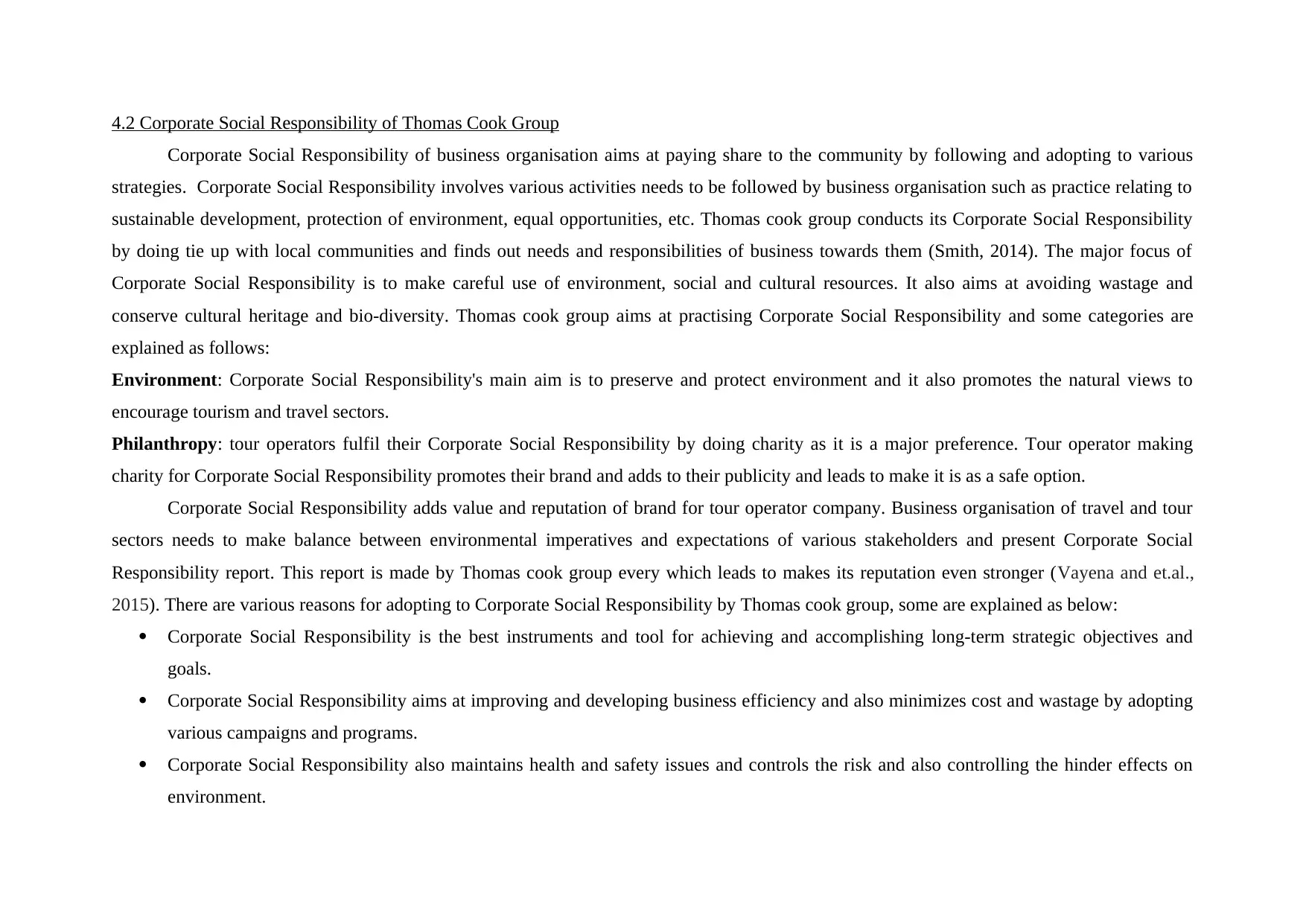
4.2 Corporate Social Responsibility of Thomas Cook Group
Corporate Social Responsibility of business organisation aims at paying share to the community by following and adopting to various
strategies. Corporate Social Responsibility involves various activities needs to be followed by business organisation such as practice relating to
sustainable development, protection of environment, equal opportunities, etc. Thomas cook group conducts its Corporate Social Responsibility
by doing tie up with local communities and finds out needs and responsibilities of business towards them (Smith, 2014). The major focus of
Corporate Social Responsibility is to make careful use of environment, social and cultural resources. It also aims at avoiding wastage and
conserve cultural heritage and bio-diversity. Thomas cook group aims at practising Corporate Social Responsibility and some categories are
explained as follows:
Environment: Corporate Social Responsibility's main aim is to preserve and protect environment and it also promotes the natural views to
encourage tourism and travel sectors.
Philanthropy: tour operators fulfil their Corporate Social Responsibility by doing charity as it is a major preference. Tour operator making
charity for Corporate Social Responsibility promotes their brand and adds to their publicity and leads to make it is as a safe option.
Corporate Social Responsibility adds value and reputation of brand for tour operator company. Business organisation of travel and tour
sectors needs to make balance between environmental imperatives and expectations of various stakeholders and present Corporate Social
Responsibility report. This report is made by Thomas cook group every which leads to makes its reputation even stronger (Vayena and et.al.,
2015). There are various reasons for adopting to Corporate Social Responsibility by Thomas cook group, some are explained as below:
Corporate Social Responsibility is the best instruments and tool for achieving and accomplishing long-term strategic objectives and
goals.
Corporate Social Responsibility aims at improving and developing business efficiency and also minimizes cost and wastage by adopting
various campaigns and programs.
Corporate Social Responsibility also maintains health and safety issues and controls the risk and also controlling the hinder effects on
environment.
Corporate Social Responsibility of business organisation aims at paying share to the community by following and adopting to various
strategies. Corporate Social Responsibility involves various activities needs to be followed by business organisation such as practice relating to
sustainable development, protection of environment, equal opportunities, etc. Thomas cook group conducts its Corporate Social Responsibility
by doing tie up with local communities and finds out needs and responsibilities of business towards them (Smith, 2014). The major focus of
Corporate Social Responsibility is to make careful use of environment, social and cultural resources. It also aims at avoiding wastage and
conserve cultural heritage and bio-diversity. Thomas cook group aims at practising Corporate Social Responsibility and some categories are
explained as follows:
Environment: Corporate Social Responsibility's main aim is to preserve and protect environment and it also promotes the natural views to
encourage tourism and travel sectors.
Philanthropy: tour operators fulfil their Corporate Social Responsibility by doing charity as it is a major preference. Tour operator making
charity for Corporate Social Responsibility promotes their brand and adds to their publicity and leads to make it is as a safe option.
Corporate Social Responsibility adds value and reputation of brand for tour operator company. Business organisation of travel and tour
sectors needs to make balance between environmental imperatives and expectations of various stakeholders and present Corporate Social
Responsibility report. This report is made by Thomas cook group every which leads to makes its reputation even stronger (Vayena and et.al.,
2015). There are various reasons for adopting to Corporate Social Responsibility by Thomas cook group, some are explained as below:
Corporate Social Responsibility is the best instruments and tool for achieving and accomplishing long-term strategic objectives and
goals.
Corporate Social Responsibility aims at improving and developing business efficiency and also minimizes cost and wastage by adopting
various campaigns and programs.
Corporate Social Responsibility also maintains health and safety issues and controls the risk and also controlling the hinder effects on
environment.
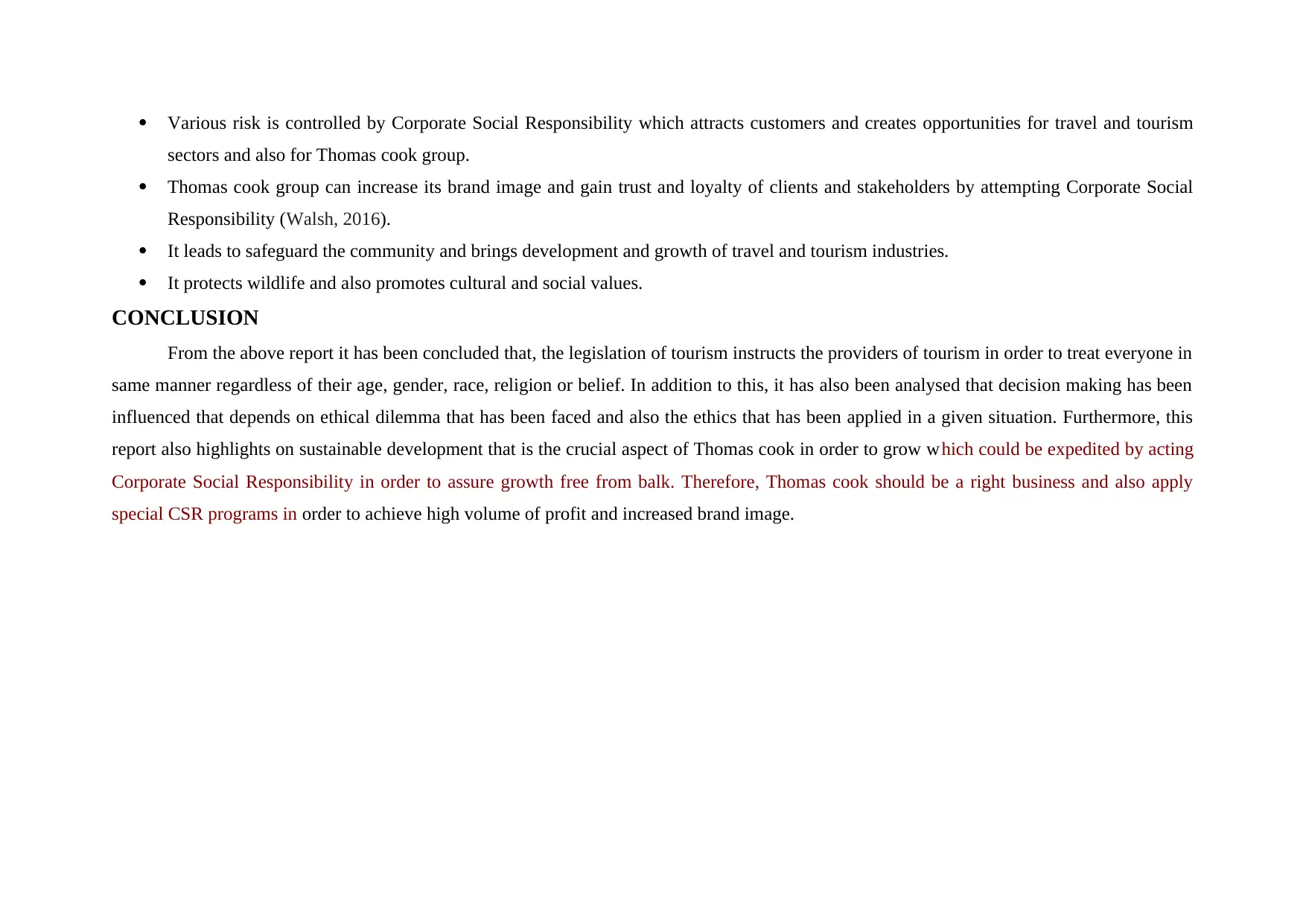
Various risk is controlled by Corporate Social Responsibility which attracts customers and creates opportunities for travel and tourism
sectors and also for Thomas cook group.
Thomas cook group can increase its brand image and gain trust and loyalty of clients and stakeholders by attempting Corporate Social
Responsibility (Walsh, 2016).
It leads to safeguard the community and brings development and growth of travel and tourism industries.
It protects wildlife and also promotes cultural and social values.
CONCLUSION
From the above report it has been concluded that, the legislation of tourism instructs the providers of tourism in order to treat everyone in
same manner regardless of their age, gender, race, religion or belief. In addition to this, it has also been analysed that decision making has been
influenced that depends on ethical dilemma that has been faced and also the ethics that has been applied in a given situation. Furthermore, this
report also highlights on sustainable development that is the crucial aspect of Thomas cook in order to grow which could be expedited by acting
Corporate Social Responsibility in order to assure growth free from balk. Therefore, Thomas cook should be a right business and also apply
special CSR programs in order to achieve high volume of profit and increased brand image.
sectors and also for Thomas cook group.
Thomas cook group can increase its brand image and gain trust and loyalty of clients and stakeholders by attempting Corporate Social
Responsibility (Walsh, 2016).
It leads to safeguard the community and brings development and growth of travel and tourism industries.
It protects wildlife and also promotes cultural and social values.
CONCLUSION
From the above report it has been concluded that, the legislation of tourism instructs the providers of tourism in order to treat everyone in
same manner regardless of their age, gender, race, religion or belief. In addition to this, it has also been analysed that decision making has been
influenced that depends on ethical dilemma that has been faced and also the ethics that has been applied in a given situation. Furthermore, this
report also highlights on sustainable development that is the crucial aspect of Thomas cook in order to grow which could be expedited by acting
Corporate Social Responsibility in order to assure growth free from balk. Therefore, Thomas cook should be a right business and also apply
special CSR programs in order to achieve high volume of profit and increased brand image.
⊘ This is a preview!⊘
Do you want full access?
Subscribe today to unlock all pages.

Trusted by 1+ million students worldwide
1 out of 14
Related Documents
Your All-in-One AI-Powered Toolkit for Academic Success.
+13062052269
info@desklib.com
Available 24*7 on WhatsApp / Email
![[object Object]](/_next/static/media/star-bottom.7253800d.svg)
Unlock your academic potential
Copyright © 2020–2025 A2Z Services. All Rights Reserved. Developed and managed by ZUCOL.




